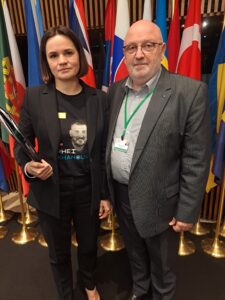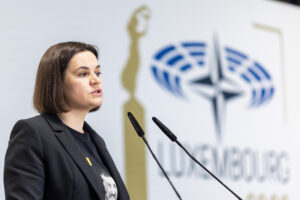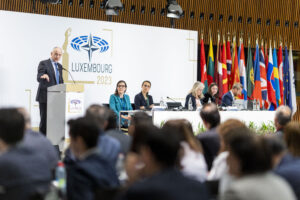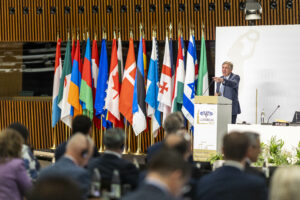Spring Session of the NATO Parliamentary Assembly – Luxembourg
From 19 to 22 May 2023, the NATO Parliamentary Assembly (NATO PA) gathered for its Spring Session in Luxembourg.
The Grand Duchy of Luxembourg, founding member of NATO and staunch advocate of its shared values, welcomed over 250 NATO parliament members and more than 100 representatives from 16 partner countries and observers for the Spring Session. The Allied parliamentarians and partners discussed how to step up support for Ukraine, accelerate the implementation of NATO’s new Strategic Concept and important decisions taken at last year’s NATO Summit, including on democratic values. The Luxembourg session debated 17 preliminary draft reports covering topics ranging from the future of robotics and novel materials in defence to global food security, Russia’s disinformation campaigns to China’s international role.
The NATO PA opened its Spring Session on Friday with a pledge to maintain support for Ukraine and an appeal for the Alliance to strengthen its defence and deterrence posture in the face of threats from Russia and other wide-ranging security challenges. “It is our common security, our values and the rules-based international order that Ukraine is defending through its courageous resistance to Russian aggression,” Joëlle Garriaud-Maylam, NATO PA President, told in a news conference on Friday. She underscored the Assembly’s call for Russia to face justice for war crimes and backed a Marshall Plan-style reconstruction programme for Ukraine. “We continue to support the integration of Ukraine into NATO” she added.
Committee Meetings
During the full weekend, five Committee Meetings were organized: the Committee on Democracy and Security, the Defence and Security Committee, the Economics and Security Committee, the Science and Technology Committee and the Political Committee. As observer, EUROMIL’s President monitored on Saturday the work of the Defence and Security Committee (DSC) and the Political Committee (PC) on Sunday.
On Saturday, the DSC, chaired by Alec Shelbrooke (United Kingdom), invited François Bausch, Deputy Prime Minister, Minister of Defence, and Minister for Mobility and Public Works of Luxembourg, to open the session. He emphasised that the security situation has completely changed. “The protection of NATO’s Eastern flank is now a priority and therefore we need a stronger focus on deterrence and common defence” the minister added. Until 2018, Luxembourg will double its defence spending compared to 2014 and thereby invest in military capabilities even beyond those required by NATO. During the Q&A, a US delegate made the remark that Luxembourg will not reach the Wales commitments on 2% defence spending. Luxembourg went from 0,3 to 0,62 % of GDP defence spending which is already substantial considering the country’s size and the size of its armed forces (about 1000 members), Minister Bausch added. At this point, he also referred to the initiative of creating a Belgian-Luxembourg operational battalion. The remark from a German delegate highlighted that the Wales commitments encompassed not only a 2% defence spending target but also a 20% investment target. In response, the Minister pointed out that Luxembourg ranks high among countries that have achieved this percentage, but it often goes unnoticed in discussions. On a question of the Ukrainian delegation, the Minister answered that they can count on Luxembourg to support them. However, he also emphasised that NATO membership can only be discussed once the conflict is over.
The Head of the Delegation of the European Parliament, Tom Vandenkendelaere (Belgium), underlined the importance of the Strategic Compass and asked how the minister looks at the complementarity with the NATO Concept. On that point, Minister Bausch answered that the Strategic Compass is a milestone for the EU and NATO. The shift in mindset of the EU Defence Ministers didn’t only change after the invasion of Russia in Ukraine, but already with the Kabul evacuation.
At the DSC, four Preliminary Draft Special Reports were discussed on Russia’s War in Ukraine, the Allied Defence Industrial Base for NATO’s New Deterrence and Defence Baseline, The Rapid Evolution of Baltic Sea Security After Russia’s Invasion of Ukraine and How Russia’s War in Ukraine Changes Black Sea Security. These reports will be back on the agenda of the next Assembly meeting.
The PC held its meeting on Sunday, chaired by Brendan Francis Boyle (United States). At the opening, Tom Köller, Director of Defence, Ministry of Foreign and European Affairs of Luxembourg, talked about Luxembourg’s Perspective on the New Strategic Landscape and NATO Adaptation. The same morning the media confirmed that Russian troops, or the Wagner group, took over Bakhmut. This “victory” for Russia did change somehow his presentation. The main topic during the Q&A was Ukraine’s NATO membership. Several members as well as the delegate from Ukraine emphasized that the 2008 Bucharest decisions were a mistake and that the war in Ukraine didn’t start in February last year, but already eight years before. “No sustainable peace will be in Europe as long as Ukraine is not a NATO member” the Ukrainian member added.

 Sviatlana Tsikhanouskaya, National Leader of Belarus and the Head of the United Transition Cabinet talked about the struggle for a democratic future of Belarus in the context of Russia’s war on Ukraine. The exiled Belarusian opposition leader Tsikhanouskaya has been handed a 15-year prison term after being convicted in absentia of treason and conspiracy to seize power, a verdict she says is punishment for her efforts to promote democracy. She fled to neighbouring Lithuania in 2020 after running against incumbent Alexander Lukashenko in a presidential election, which official results showed Lukashenko won by a landslide. Lukashenko, an ally of Russian President Vladimir Putin, unleashed a brutal crackdown on demonstrators, accusing the opposition of plotting to overthrow the government. Key opposition figures and activists were arrested, while others fled the country. “Belarus is a country with a European past and a European future” Sviatlana Tsikhanouskaya added. She also emphasised that Lukashenko and his regime should be brought before the international tribunal for war crimes and crimes against humanity.
Sviatlana Tsikhanouskaya, National Leader of Belarus and the Head of the United Transition Cabinet talked about the struggle for a democratic future of Belarus in the context of Russia’s war on Ukraine. The exiled Belarusian opposition leader Tsikhanouskaya has been handed a 15-year prison term after being convicted in absentia of treason and conspiracy to seize power, a verdict she says is punishment for her efforts to promote democracy. She fled to neighbouring Lithuania in 2020 after running against incumbent Alexander Lukashenko in a presidential election, which official results showed Lukashenko won by a landslide. Lukashenko, an ally of Russian President Vladimir Putin, unleashed a brutal crackdown on demonstrators, accusing the opposition of plotting to overthrow the government. Key opposition figures and activists were arrested, while others fled the country. “Belarus is a country with a European past and a European future” Sviatlana Tsikhanouskaya added. She also emphasised that Lukashenko and his regime should be brought before the international tribunal for war crimes and crimes against humanity.
Furthermore, a roundtable discussion on “Russia’s War on Ukraine: Preliminary Lessons and Future Scenarios” took place. Tomas Valasek (Slovakia), talked as General Rapporteur about his Preliminary Draft General Report “Russia’s War Against Ukraine: Rethinking the Global Order and Lessons Learned for NATO”. Roland Freudenstein, Vice President of GLOBSEC and Head of GLOBSEC Brussels joined the panel and addressed the PC on “Central and Eastern Europe – Leading the Way in EU Security”.
Finally, the PC members discussed three Draft Reports on China’s Global Role in the Wake of Russia’s War against Ukraine, The Future of NATO’s Open Door Policy and finally Shifting Geopolitics in Iran and the Gulf Preliminary. Also, these reports will be again on the agenda of the Copenhagen Annual Session.
Plenary sitting
The Plenary Sitting was held on Monday 22 May 2023 and was opened by the President of the NATO PA, Joëlle Garriaud-Maylam. The plenary session was also addressed by Luxembourg Prime Minister Xavier Bettel, NATO’s Deputy Secretary General Mircea Geoana and Ukrainian Defence Minister Oleksii Reznikov.
A declaration reaffirming unwavering support for Ukraine and urging Allied governments to step up military supplies has been adopted. In a second declaration, the Assembly recommended a series of measures to be adopted at the Alliance’s upcoming summit in Vilnius (Lithuania) in July 2023. The resolution calls for NATO leaders to strengthen the Alliance militarily, defend democratic values, and focus on strengthening Allied resilience.
The next Annual Session of the Parliamentary Assembly will be held in Copenhagen (Denmark) in October 2023.


